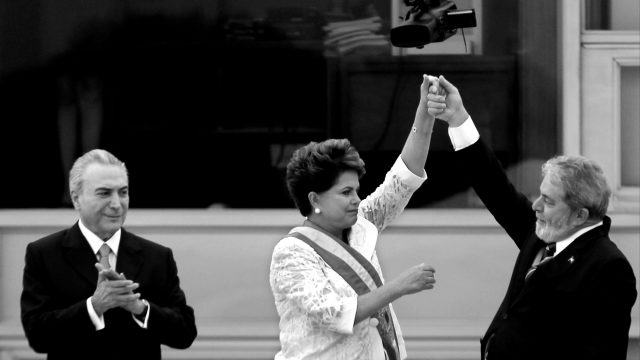Sundance 2019: The Edge of Democracy, by David Bax

Petra Costa’s criminally underseen 2012 documentary Elena is a deeply personal work about family, dreams and loss. So her new film, The Edge of Democracy, about the short lived rule of Brazil’s progressive Workers’ Party and its shameful dismantling by right wing powers and big business, would seem to be a departure. But with a grandfather who cofounded one of the construction firms that have benefited from decades of political corruption and two parents who spent years either in prison or in hiding from the military dictatorship for their pro-labor activism, she has no shortage of connections to both sides of the issues she explores here. It may be a cliché that “the political is personal” but, as The Edge of Democracy proves, that’s because it’s true.
Lula da Silva didn’t begin his political career until he was 35 but, more than twenty years after founding the Workers’ Party, he was elected president of Brazil in 2002. He served two terms and was succeeded by Dilma Rousseff, the nation’s first female president and another member of da Silva’s party. In Rousseff’s second term, though, corruption investigations were seized upon by the party’s right wing opposition who, despite no evidence against them, were able to paint with a broad enough brush to impeach Rousseff and send da Silva to prison, moves which culminated this past year in the election of Jair Bolsonaro, a racist and misogynist far-right buffoon.
Though Costa has moved into a more journalistic mode of documentary filmmaking, she hasn’t left behind her stylistic flair. Her nearly affectless narration belies her rage and shame at her own nation; she punctuates many of these spoken passages with peaceful, floating Steadicam shots of the interior of the Palácio do Planalto (Brazil’s presidential palace), empty and awaiting the will of either the people or the oligarchs. In another bravura shot, a drone floats peacefully above Brasilia (the capital), until it crests the congress’ building and suddenly finds a raging protest underway.
While The Edge of Democracy is both edifying and infuriating about the particulars of Brazil’s recent history, it also speaks to the larger frustration that awaits the politics of idealism anywhere in the world. Namely, once an idealist wins, they immediately must compromise the values that got them elected in order to achieve a portion of the good they promised. Lula (as he is known to all Brazilians) struck deals with major business interests that appalled some of his supporters but he also reduced unemployment to the lowest level in the nation’s history and increased education and literacy, particularly to the poor and minorities who had traditionally been left out of such opportunities. But perhaps the most deflating lesson of the Workers’ Party’s tenure, as unveiled by the corruption investigation, is that greed knows no political affiliation; it will adapt to whoever’s in power.
Recently, not just in Brazil but all over the world, including the United States, amoral systems of power have found purchase in the right wing, mutating populism into, oxymoronically, a vocal and effective minority. When a nation’s workers are led to believe that patriotism has less to do with their own civic power and more to do with pandering platitudes about God and family (and, of course, all the racist dog whistles you can handle), that’s how you end up with vile, empty blowhards like Donald Trump or, as seen in The Edge of Democracy–complete with corny, “Buddy Christ” finger guns–Jair Bolsonaro.





























It is not a documentary. It’s fiction. Totally unrealistic